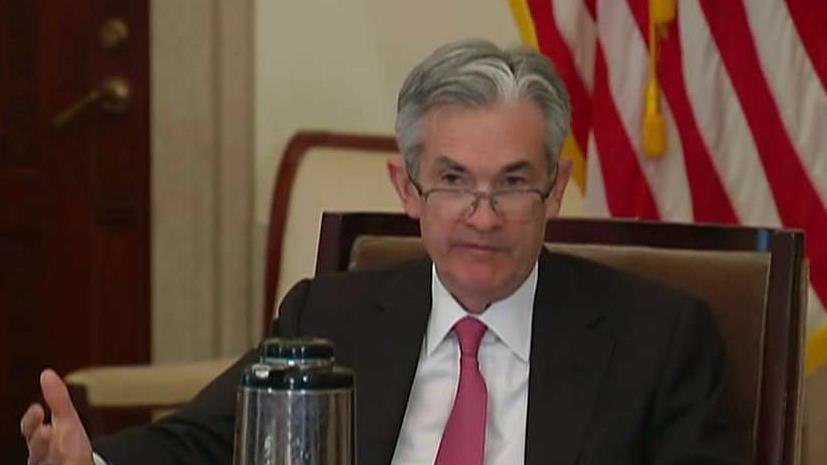Trump's Fed favorite Powell won't rock the boat if picked for chair
President Donald Trump could select Jerome Powell as the next chairman of the Federal Reserve as early as this weekend, an appointment that most economic observers say will meet two of the president’s main objectives in choosing the nation’s top central banker: A Fed chief who will not drastically raise interest rates and one who believes the current regulatory environment is too harsh and must be reined in to stimulate economic growth.
As previously reported by FOX Business, Powell, a current Fed governor and former partner at The Carlyle Group, is the odds on favorite to replace Janet Yellen as chair of the country’s central bank when her term ends next year, according to people close to the decision making process. Trump, these people say, could make the decision official any day now, but given his volatile decision-making process, he could change course and appoint someone else. One other possibility: He could reappoint Yellen to another four-year term.
That said, sources familiar with the matter say Powell is in line for the job, and in appointing Powell, the administration would be getting someone who, from a policy standpoint, embodies all of what Trump believes are the key attributes of those candidates who have made his short list, the sources added.
Like Yellen, for instance, Powell is a monetary policy “dove,” meaning he believes in keeping interest rates low to spur job creation, and that he thinks the Federal Reserve should focus on maintaining low unemployment before addressing the other part of its mandate: cutting back on inflation, which Yellen recently described as “surprisingly soft”. Trump himself has boasted about his desire to keep interest rates low.
Unlike Yellen, however, Powell is an advocate of another Trumpian policy mandate: A looser regulatory framework, particularly for banks. The Federal Reserve has maintained strict oversight, thanks to the Dodd-Frank legislation following the financial crash of 2008. Powell believes the burdens of regulations have forced banks to scale back on lending and hurt the post-economic recovery, where GDP growth remained muted by historical standards.
That puts him in line with two other candidates: Stanford University business professor and former Fed governor Kevin Warsh and John Taylor, a former Treasury Department official and an economics professor at Stanford. The argument against both Warsh and Taylor is that contrary to Trump, they are considered “hawks” on monetary policy, meaning they would more quickly unwind the Fed’s balance sheet of bonds and other financial securities it snapped up from banks as a way to lower interest rates in recent years.
A quick unwind could lead to higher interest rates and skittish markets, both Trump and his key economic advisers believe.
“Taylor is a more disciplined guy, and he’s constantly questioning the Fed’s [dovish monetary policy] and this is the same issue as Warsh,” said market analyst Chris Whalen. “Taylor and Warsh represent a more purposely and serious analysis of monetary policy, and the street doesn’t like that and probably not the president.”
A White House spokeswoman declined to comment, but White House Press Secretary Sarah Sanders told reporters that Trump will make his announcement on the new Fed chair by next week.
The Federal Reserve chair is a quasi-independent position; candidates are selected by the president and approved by the Senate for a four-year term. The Fed chair is not part of the president’s cabinet, but as the nation’s top banker, the chair works closely with key economic decision makers in the White House on policy matters.
Powell’s likely appointment follows a lobbying effort led by Treasury Secretary Steven Mnuchin, who believed Powell’s approach to regulation and monetary policy would best align with Trump’s economic agenda and spur economic growth.
The GDP averaged a paltry 1.5% during the eight years of the Obama presidency. Trump’s goal is to boost growth to between 3% and 4%, which in turn should benefit the middle class struggling with little to no wage growth.
Thus, if Powell is selected, Mnuchin’s power within the White House would be strengthened, given the prominent role the Fed has in setting economic policy -- particularly since the financial crisis, when new legislation enhanced the Fed’s role in regulating the nation’s large and community banks.
“Powell is viewed by some as an ‘empty suit,’ so Mnuchin might see him as more easily influenced and less competition,” said Stephen Myrow, managing partner at Beacon Policy Advisors, a Washington-based research policy firm.
To be sure, Trump may change his mind and move forward with one of the other three candidates in Yellen, Warsh or Taylor, people close to the White House say. They pointed to an interview on Wednesday with FOX Business’ Lou Dobbs, during which Trump said he has grown to respect Yellen, despite criticizing her during the 2016 presidential election.
Still, in that same interview, Trump noted, “You’d like to make your own mark,” suggesting that he is leaning toward making a change at the Fed. For that reason and others involving policy, Trump is likely to replace Yellen with Powell, people with knowledge of the matter added.
In April at the Global Finance Forum in Washington D.C., Powell criticized Dodd-Frank, saying the legislation should be reviewed, while also noting “core reforms” should stay in place.
“The new rule book is excessively complex,” he said, somewhat echoing what candidate Trump said during the 2016 campaign about banking laws.
“In too many cases new regulation has been inappropriately applied to small and medium-sized institutions. We need to go back and broadly raise thresholds of applicability and look for other ways to reduce burden on smaller firms,” he said.




















